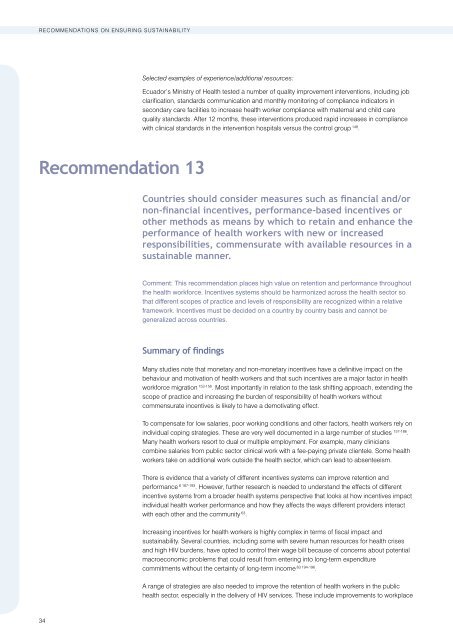Task Shifting - Global Recommendations and Guidelines - unaids
Task Shifting - Global Recommendations and Guidelines - unaids
Task Shifting - Global Recommendations and Guidelines - unaids
You also want an ePaper? Increase the reach of your titles
YUMPU automatically turns print PDFs into web optimized ePapers that Google loves.
<strong>Recommendations</strong> on ensuring sustainability<br />
Selected examples of experience/additional resources:<br />
Ecuador’s Ministry of Health tested a number of quality improvement interventions, including job<br />
clarification, st<strong>and</strong>ards communication <strong>and</strong> monthly monitoring of compliance indicators in<br />
secondary care facilities to increase health worker compliance with maternal <strong>and</strong> child care<br />
quality st<strong>and</strong>ards. After 12 months, these interventions produced rapid increases in compliance<br />
with clinical st<strong>and</strong>ards in the intervention hospitals versus the control group 148 .<br />
Recommendation 13<br />
Countries should consider measures such as financial <strong>and</strong>/or<br />
non-financial incentives, performance-based incentives or<br />
other methods as means by which to retain <strong>and</strong> enhance the<br />
performance of health workers with new or increased<br />
responsibilities, commensurate with available resources in a<br />
sustainable manner.<br />
Comment: This recommendation places high value on retention <strong>and</strong> performance throughout<br />
the health workforce. Incentives systems should be harmonized across the health sector so<br />
that different scopes of practice <strong>and</strong> levels of responsibility are recognized within a relative<br />
framework. Incentives must be decided on a country by country basis <strong>and</strong> cannot be<br />
generalized across countries.<br />
Summary of findings<br />
Many studies note that monetary <strong>and</strong> non-monetary incentives have a definitive impact on the<br />
behaviour <strong>and</strong> motivation of health workers <strong>and</strong> that such incentives are a major factor in health<br />
workforce migration 153-156 . Most importantly in relation to the task shifting approach, extending the<br />
scope of practice <strong>and</strong> increasing the burden of responsibility of health workers without<br />
commensurate incentives is likely to have a demotivating effect.<br />
To compensate for low salaries, poor working conditions <strong>and</strong> other factors, health workers rely on<br />
individual coping strategies. These are very well documented in a large number of studies 157-186 .<br />
Many health workers resort to dual or multiple employment. For example, many clinicians<br />
combine salaries from public sector clinical work with a fee-paying private clientele. Some health<br />
workers take on additional work outside the health sector, which can lead to absenteeism.<br />
There is evidence that a variety of different incentives systems can improve retention <strong>and</strong><br />
performance 6 187-193 . However, further research is needed to underst<strong>and</strong> the effects of different<br />
incentive systems from a broader health systems perspective that looks at how incentives impact<br />
individual health worker performance <strong>and</strong> how they affects the ways different providers interact<br />
with each other <strong>and</strong> the community 63 .<br />
Increasing incentives for health workers is highly complex in terms of fiscal impact <strong>and</strong><br />
sustainability. Several countries, including some with severe human resources for health crises<br />
<strong>and</strong> high HIV burdens, have opted to control their wage bill because of concerns about potential<br />
macroeconomic problems that could result from entering into long-term expenditure<br />
commitments without the certainty of long-term income 63 194-196 .<br />
A range of strategies are also needed to improve the retention of health workers in the public<br />
health sector, especially in the delivery of HIV services. These include improvements to workplace<br />
34

















